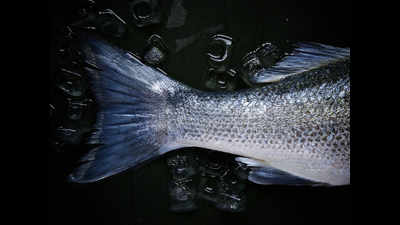Trending
This story is from October 30, 2018
File affidavit on ‘permissible limit’ of formaldehyde: Goa high court
Directs Goa government to randomly test fish

Representative image
PANAJI: The high court of Bombay at Goa, on Monday, has directed the Food Safety and Standards Authority of India (FSSAI) to file an affidavit on whether the limit of 4 miligram per kilogram of formaldehyde can be taken as ad hoc standard.
The court also asked the state government to carry out random inspections to test the fish in the state.

After hearing the public interest litigations filed in the formalin-in-fish issue, a division bench comprising Justice N M Jamdar and Justice Prithviraj K Chavan said “the Authority will also file an affidavit whether pending fixing of standards by the scientific panel, the limit of 4 mg per kg as per their guidance note can be taken as an ad hoc standard”.The HC gave the authority two weeks to file the affidavit. The court has asked FSSAI to expedite the process of taking up the task to set the standards, as initiated by the letter dated October 12.
In the advisory issued by the FSSAI to consumers under the guidance note, naturally occurring formaldehyde in fish is indicated as approximately 4 mg per kg.
The court has also directed the government to file an affidavit on whether the wholesale fish market at Margao is controlled by the planning authority or the municipal council or is a private market. Stating that the Municipalities Act has laid down various provisions on how to conduct a market, the court said, “The Pollution Control Board, in the year 2016, carried out an inspection and found that toxins are flowing into the river and suggestions have been given to improve the hygiene.”
The HC directed the state to file an affidavit regarding these issues and directed it to take steps to correct any lacunae found in the conducting of the wholesale market.
Referring to the statement made by the government that it has already initiated action against various wholesale traders, the high court ordered that the government place on record the action taken and its plans with respect to authorisation of traders, pollution control measures and overall hygiene.
The court also asked the state government to carry out random inspections to test the fish in the state.

After hearing the public interest litigations filed in the formalin-in-fish issue, a division bench comprising Justice N M Jamdar and Justice Prithviraj K Chavan said “the Authority will also file an affidavit whether pending fixing of standards by the scientific panel, the limit of 4 mg per kg as per their guidance note can be taken as an ad hoc standard”.The HC gave the authority two weeks to file the affidavit. The court has asked FSSAI to expedite the process of taking up the task to set the standards, as initiated by the letter dated October 12.
The court also directed the state government to carry out inspections everyday at different randomly chosen locations to test the fish being sold. “In the report, the quantity of formalin found should be specified to a figure, as we are informed that the earlier reports have only mentioned the quantity as ‘permissible limit’. The compilation of these reports be made and submitted to the court on the next date of the hearing,” the court ordered.
In the advisory issued by the FSSAI to consumers under the guidance note, naturally occurring formaldehyde in fish is indicated as approximately 4 mg per kg.
The court has also directed the government to file an affidavit on whether the wholesale fish market at Margao is controlled by the planning authority or the municipal council or is a private market. Stating that the Municipalities Act has laid down various provisions on how to conduct a market, the court said, “The Pollution Control Board, in the year 2016, carried out an inspection and found that toxins are flowing into the river and suggestions have been given to improve the hygiene.”
The HC directed the state to file an affidavit regarding these issues and directed it to take steps to correct any lacunae found in the conducting of the wholesale market.
Referring to the statement made by the government that it has already initiated action against various wholesale traders, the high court ordered that the government place on record the action taken and its plans with respect to authorisation of traders, pollution control measures and overall hygiene.
End of Article
FOLLOW US ON SOCIAL MEDIA










